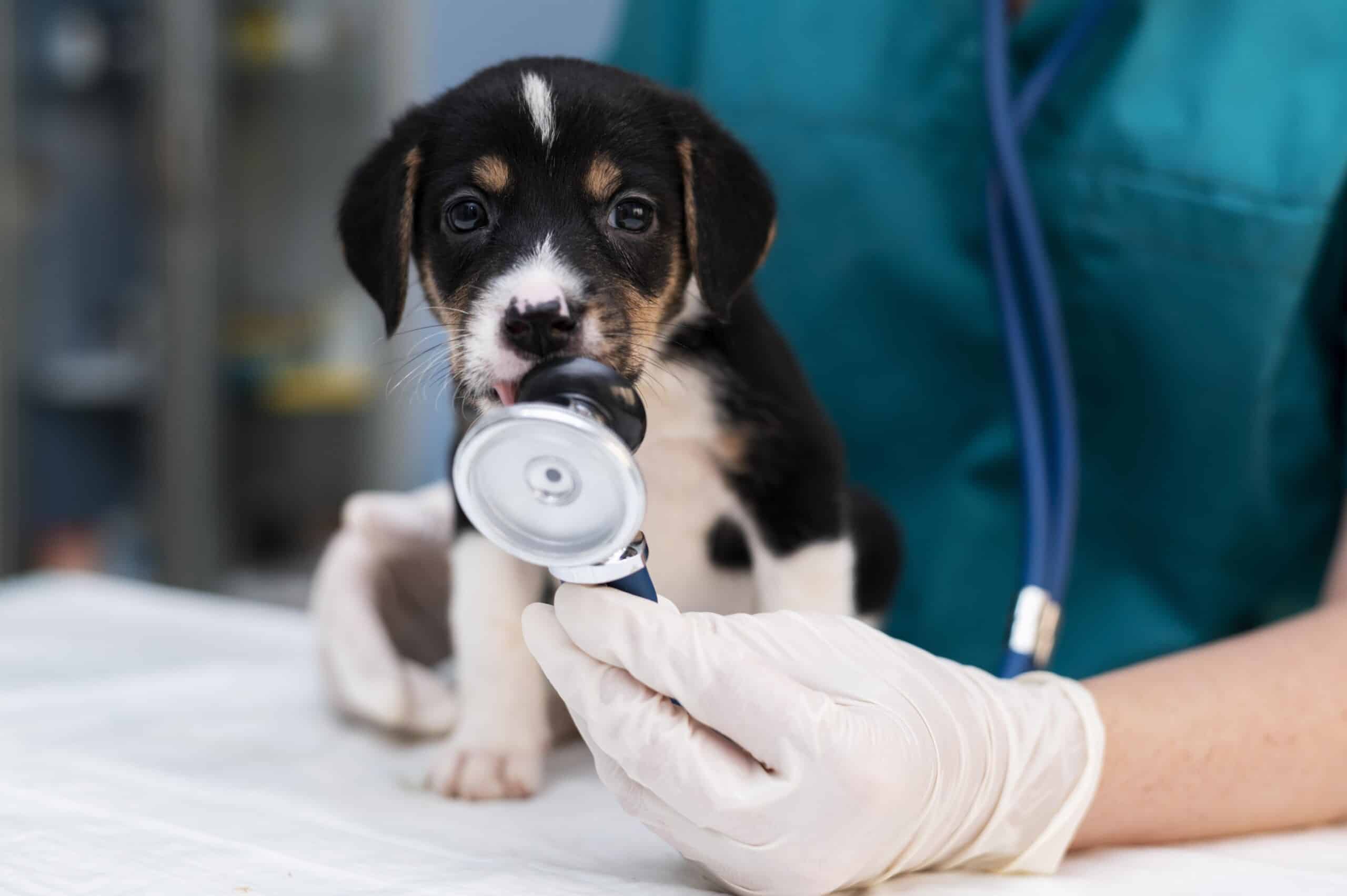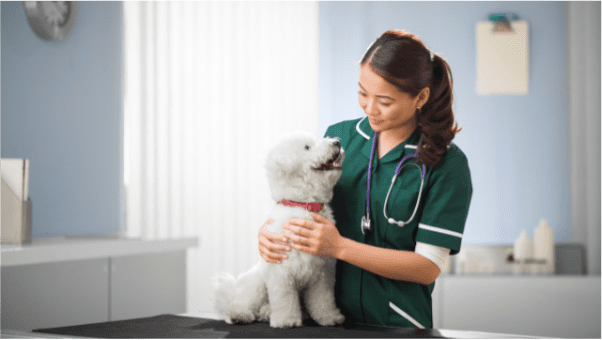How Often Should I Take My Pet to the Vet?

Find out what your pet needs from 2-3 weeks to six months old, to 1-7 years to 7+ years old, what expenses pet insurance covers, and more.
Your pet should see the vet at least once a year, but the frequency of visits varies depending on their age and health status. New puppies, for example, are protected by their mother’s antibodies in the first few weeks of life. Still, they must visit the vet for general check-ups, tests, vaccinations, and other treatments to help them grow into healthy puppies.
Similarly, cats require multiple visits to their veterinarian in the first year of life for vaccinations, screenings, and preventive care, while birds and reptiles also need regular check-ups at set intervals based on species-specific needs. It’s essential that you work closely with your veterinarian to create a customized healthcare plan for your pet that ensures long-term happiness and health for both of you!
How Often Should I Take My New Puppy or Kitten to the Vet? (0–1 Year)
Bringing home a new furry family member is an exciting time! Whether you’ve adopted a kitten or a puppy, both need regular vet visits to ensure they grow up healthy and strong. Below are general guidelines for each.
For Kittens
- Initial Checkup:Take your new kitten to the veterinarian within one week of bringing them home for a complete physical exam. The vet will check for any health concerns and may recommend vaccinations or deworming if needed.
- Vaccinations: Kittens need a series of vaccinations to protect against infectious diseases. These are typically given every 3–4 weeks until they reach 16 weeks old.
- Spaying or Neutering: Most vets recommend spaying or neutering kittens between 4–6 months of age.
- Parasite Prevention: Because kittens are vulnerable to fleas, ticks, and intestinal worms, ask your vet about a regular flea and tick prevention plan.
Regular veterinary visits ensure your kitten stays healthy, happy, and on track for a long, joyful life.
For Puppies
Two to Three Weeks Old:
Your vet will:
-
Check your puppy’s general health and development
-
Administer deworming medications
Six to Eight Weeks Old:
This stage usually coincides with your puppy’s first vaccinations. During this visit, your vet will:
-
Give the first set of vaccines
-
Begin heartworm prevention
-
Start flea and tick protection
-
Recommend microchipping
Up to Six Months Old:
As your puppy grows and starts to socialize, plan additional visits for:
-
Booster vaccinations
-
Spaying or neutering
-
Advice on nutrition, training, and behavior
Regular checkups help prevent infections, monitor growth, and establish lifelong healthy habits for your pup.
How Frequently Should I Visit the Vet with My Adult Puppy (1-7 Years)?
For cats and dogs, adulthood starts at year one, and it is a great time to resume the visits you started earlier. We recommend taking your adult pet to the vet once a year.
Although the annual visits to the vet will not be as frequent as the first few weeks and months, they are essential for your puppy’s health as he navigates adulthood. When you visit your vet with your one-year-old dog, the vet will:
- Resume vaccination and give booster doses of previous vaccines
- Do physical checks for injuries, boils, sores, and other abnormalities
- Examine blood, poop, and urine samples for parasites, worms, and other canine or feline diseases
Some states require your puppy to receive recommended vaccines at specific ages. You may need to check with your vet to find out which vaccines are required for pets in your state.
These routine tests and vaccinations could be expensive. That’s why the Odie Wellness Plan could prove handy. The Wellness Plan offsets the costs of everyday pet care items, including flea and tick medications, vaccinations, and more. The popular Basic plan is great for pets of all ages and types, while the Plus plan is tailored for puppies and kittens.

How Often Should I Bring My Adult Cat (3-6 Years) to the Vet?
As cats enter adulthood, their healthcare needs shift significantly, and regular vet visits become even more crucial than during kittenhood. Here is what to expect during an adult cat’s trip to see the veterinarian:
- Dental Care: Dental care for cats of all ages is essential, especially as they age. Your veterinarian may recommend professional cleaning sessions or provide guidance for maintaining good oral hygiene at home.
- Weight Management: Maintaining an ideal body weight is of vital importance to the well-being of any cat, which is why annual visits will involve weighing your cat, discussing his/her weight with you, and suggesting an exercise/diet plan if necessary.
- Behavior Issues in Adult Cats: Litter Box Issues or Aggression. If any changes to your cat’s behavior arise, such as litter box issues or aggression, be sure to speak to your veterinarian as soon as possible.
- Geriatric Care: As cats age and require additional care, your vet may recommend more frequent visits or specific tests to monitor their well-being.
How Often Should I Take My Senior Dog to the Veterinarian (7+ Years)?
Once your pet is over 7 years old, congratulations —they are now a senior pet! Senior age comes with senior check-ups, so vets recommend you take your pet for two check-ups per year.
The logic for an extra check-up is simple. Senior dogs are more likely to have greater health issues than adult dogs. As your pet ages, his immunity and organs weaken, and his body becomes vulnerable to infections and diseases. Your pet needs advanced check-ups and care to keep its tail wagging at a senior age.
When you take your senior pet to the vet, they may:
- Conduct the usual check-ups, but this time more thoroughly
- Examine the internal organs, such as the liver and kidneys, via blood and urine tests
- Recommend special diets or care instructions for your pet
Beyond diets and tests, you must monitor your senior pet for behavioral changes. As your pet ages, its “personality” should be very familiar to you. Watch for changes in this personality as your pet ages. These changes can manifest in their energy levels, appetite, or response to familiar cues and commands. Observe their “petiquettes” too, so that you may note changes you can discuss with your vet. These changes may need specialist care.
The changes may also be due to injuries or infections that cannot wait until your annual visits, so you may need to break protocol and take your pet for immediate care.
How Often Should I Bring My Senior Cat to the Veterinarian (7+ Years)?
Cats that reach seven are considered seniors and require regular vet visits as they become more prone to health issues with age. Here is what to expect during senior cat visits to a veterinarian:
- Bi-Annual Checkups: Elderly cats should undergo comprehensive exams at least twice annually, which include reviewing their medical history, physical exam, blood work, and any necessary vaccinations.
- Geriatric Care: Your veterinarian may suggest additional tests, such as blood pressure monitoring, to identify any health issues that are not immediately evident.
- Dental Care: Senior cats may be more prone to dental issues. Your vet may suggest more regular dental cleanings to maintain good oral hygiene.
- Nutrition: As cats age, their nutritional requirements may change; your vet may suggest a specific diet tailored specifically for senior cats.
Your vet can address your cat’s needs and manage any age-related health conditions they might encounter, including mobility issues like arthritis or joint pain. They may offer supplements or medication to reduce discomfort and promote greater mobility in older cats.

How Often to Bring Other Pets to the Vet
Just like dogs and cats, other species, such as birds, reptiles, and small mammals, require routine veterinary care as part of their well-being. Their frequency of visits varies based on factors like species, age, and health status.
For instance, birds may need annual wellness exams to monitor health and nutrition, while small mammals such as rabbits or guinea pigs may require more frequent appointments due to potential dental issues.
Below is a general breakdown of recommended veterinary care for various species:
Birds
- Parrots and other large birds should receive annual wellness exams, blood work, and imaging studies to screen for health issues such as beak and feather disease and heart disease.
Reptiles
- Snakes require annual wellness exams that include a physical exam, fecal analysis, and blood testing to detect common health problems like respiratory infections and parasites.
- Turtles and tortoises need annual wellness exams consisting of physical exams, fecal analysis, and blood work are recommended in order to detect common health issues like shell rot and vitamin deficiencies.
- Lizards require annual wellness exams that include physical examination, fecal analysis and bloodwork to screen for common health issues like metabolic bone disease and parasites.
Other Small Mammals
- Rabbits should receive biannual wellness exams, including dental checks to monitor for dental issues like malocclusions or tooth abscesses.
- Ferrets need annual physical exams with blood work screening for common health concerns like adrenal gland disease or insulinomas.
- Guinea Pigs’ annual wellness exams should include dental check-ups to detect malocclusion or overgrown teeth issues.
- Hamsters and gerbils should have annual dental screenings to check for similar problems.
How Often Should I Take My Pregnant Pet to the Vet?
It is recommended that you take your pet to the vet several times when they are pregnant. The antenatal visits can start two to three weeks after you suspect your pet is pregnant or has mated.
Three to four weeks into the pregnancy, the vet may perform an ultrasound assessment of your puppy and do blood tests to assay hormone levels (e.g., relaxin level).
The vet may review your pet’s nutritional needs early to give you tips on managing their morning symptoms and increased appetite.
Your visits to the vet may become frequent once your pet enters the third trimester. The due date is near, so a regular visit may help prevent a miscarriage or complicated whelping for your dog.
Once the third trimester starts at around day 45, the vet may:
- Feel your dog’s abdomen to check on the pups
- Request an X-ray to know the number and size of puppies on the way
- Schedule a C-section if the puppies are too large to pass safely through the birth canal
Besides, you may want to allow your young female dogs a few heat cycles before breeding. Such cycling will help your dog mature physically to take on the stress of pregnancy and the responsibility of mothering her pups.
Pregnant cats should visit the veterinarian periodically during their gestation. Ultrasound scans may be performed to evaluate the health of developing kittens and discuss any special nutritional requirements during gestation.
Pet owners with other types of animals, like rabbits or guinea pigs, should bring them in immediately if they suspect pregnancy or show any unusual symptoms, such as weight gain.

When Should I Take My Pet to the Vet?
Ideally, you should take your pet to the vet at least once a year, even if they are healthy. The visits will cover general check-ups, vaccination, and professional support on grooming, breeding, and nutrition. However, exceptional cases may need you to take your pet to the vet at specific times and more frequently.
Your pet won’t be able to tell they have a headache, an allergy, or discomfort that can indicate a more serious health concern. So, you need to pay attention. Start by closely monitoring their appearance and daily patterns, such as their eating habits, energy levels, physical appearance, and toilet episodes.
A healthy dog should have a shiny and smooth coat of fur that reflects meticulous skin care, grooming, and nutrition, but a dog under stress from a long-standing illness may have coarse and brittle hair without the usual shine or texture. If you notice your puppy’s fur losing shine or becoming brittle, it’s worth discussing with your vet.
Another sign to look out for is if your puppy is losing so much fur that they have patches of skin visible or if they have scaly, flake, or rashy skin under their fur. These symptoms might indicate larger skin problems and dermatology issues that should be discussed with the vet and may need medication treatment.
If your dog starts refusing food or throwing up after eating, it could be a sign of a serious health issue. Some possible causes include gastrointestinal problems, liver disease, or pancreatitis. It’s important to take your dog to the vet as soon as possible to identify the underlying cause and provide treatment.
In some cases, your vet may recommend changes to your dog’s diet or prescribe medication to manage their symptoms. Having an upset stomach after eating isn’t always a big problem – just like humans, your dog can have a single meal that just doesn’t agree with them – but if the problem persists for multiple days or seems to happen after every single meal, you should always err on the side of caution and see if there is a bigger problem at play.
Once you’ve found the right food for your pet, you need to note how much they eat every day. You can discuss the appropriate feeding amounts with your vet to ensure you understand how much food your dog should eat. A missed meal or two may not cause alarm, but if your pet refuses food or water and has no appetite for over a few days, and it’s not because of a recent dietary change or another known cause, you may have a sick pet on your hands.
Sometimes your pet may eat normally but drink so much that you must refill their water bowl constantly. Frequent thirst and urination are common symptoms of canine diabetes or kidney disease. That said, some dogs need more water than others! It’s more important to monitor sudden changes to their water intake patterns than the absolute amount they drink every day. If your dog suddenly needs a lot more water daily, it’s worth talking to your veterinarian and ensuring this is not because of an underlying concern.
Cats require regular vet visits just like dogs do. At least once annually, your cat should see their vet for a wellness exam, vaccinations, and parasite prevention. Dental check-ups and blood work may be performed to detect age-related health concerns in older cats.
Other animals, like rabbits, guinea pigs, and ferrets, may require more frequent vet visits due to specific health requirements. In general, it’s best to take your pet in for a check-up once a year at minimum and consult with their vet for specific guidance.
Whatever your reason for seeing a vet, you must ensure your pet visits the right vet. Choosing the right vet for your pet should start before you need to see one. You can ask friends and family for the best vet in town or check your state’s vet registry or association to choose the vet that meets your needs and value.
Another choice you need to make is a convenient payment option. Pet care could be costly, and you may be unable to afford everything out of pocket. Packages like the Odie Wellness Plans offer exciting alternatives to ensure your pets get routine care.
What Type of Coverage Does Odie Pet Insurance Provide?
Pet insurance covers various veterinary expenses, providing financial protection and peace of mind for pet owners. Here are the details of the coverage options offered by Odie Pet Insurance:
Illness & Injury Plan
The Illness & Injury Plan is an all-inclusive insurance plan designed to cover a wide range of medical needs for your pet. This plan includes comprehensive coverage for various illnesses, injuries, and veterinary services. Some of the covered items include:
- Veterinary exams and consultations
- Diagnostics (e.g., X-rays, lab tests)
- Prescribed medications
- Surgeries and hospitalization
- Rehabilitation, acupuncture, or chiropractic treatments
- Medically necessary supplies
- Euthanasia and cremation
The Wellness Plan
The Wellness Plan is a monthly membership that focuses on preventive care and covers routine veterinary services.
- Provides reimbursements for routine care items such as wellness visits (exams and vaccines), testing and parasite prevention, dental cleanings and at-home dental care, vitamins, supplements, and more.
- Through Odie’s partnership with Petivity, a leader in smart pet products and proactive care, Wellness Plan members can also receive reimbursements for Petivity devices and health kits, as well as eligible Purina food and supplements.
- Total reimbursement up to $700 per year.



